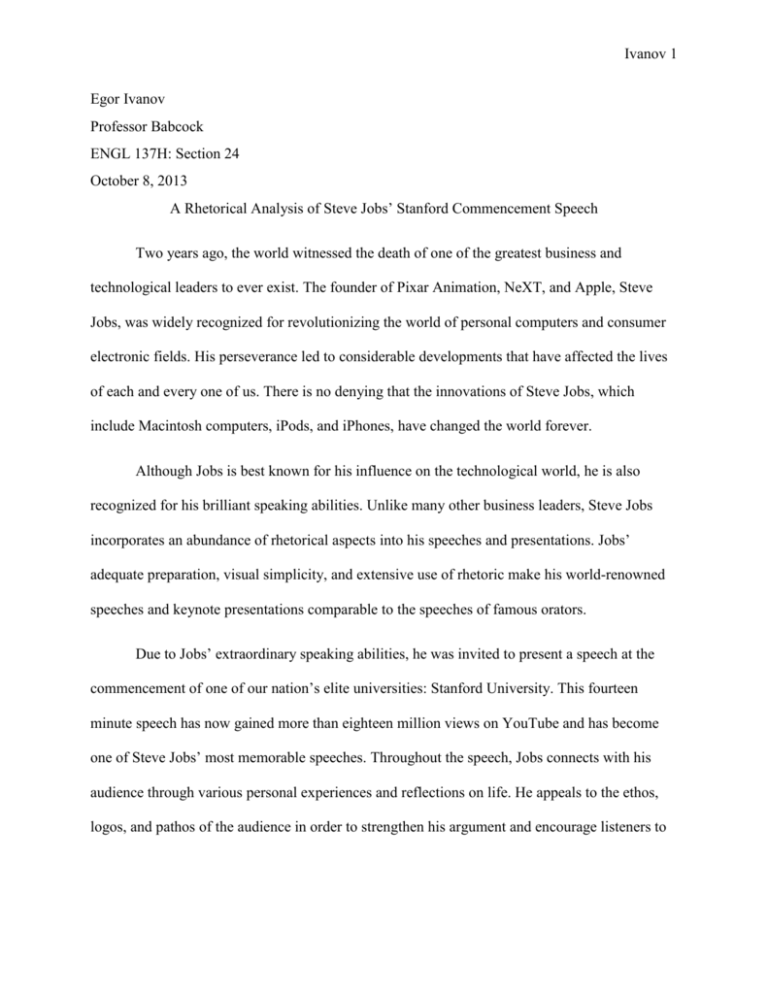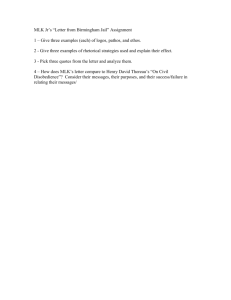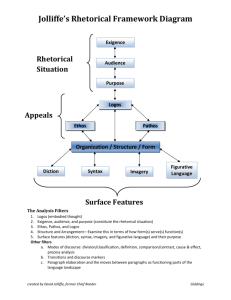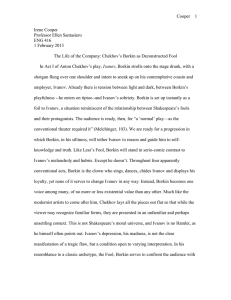Rhetorical Analysis of Steve Jobs' Stanford Speech
advertisement

Ivanov 1 Egor Ivanov Professor Babcock ENGL 137H: Section 24 October 8, 2013 A Rhetorical Analysis of Steve Jobs’ Stanford Commencement Speech Two years ago, the world witnessed the death of one of the greatest business and technological leaders to ever exist. The founder of Pixar Animation, NeXT, and Apple, Steve Jobs, was widely recognized for revolutionizing the world of personal computers and consumer electronic fields. His perseverance led to considerable developments that have affected the lives of each and every one of us. There is no denying that the innovations of Steve Jobs, which include Macintosh computers, iPods, and iPhones, have changed the world forever. Although Jobs is best known for his influence on the technological world, he is also recognized for his brilliant speaking abilities. Unlike many other business leaders, Steve Jobs incorporates an abundance of rhetorical aspects into his speeches and presentations. Jobs’ adequate preparation, visual simplicity, and extensive use of rhetoric make his world-renowned speeches and keynote presentations comparable to the speeches of famous orators. Due to Jobs’ extraordinary speaking abilities, he was invited to present a speech at the commencement of one of our nation’s elite universities: Stanford University. This fourteen minute speech has now gained more than eighteen million views on YouTube and has become one of Steve Jobs’ most memorable speeches. Throughout the speech, Jobs connects with his audience through various personal experiences and reflections on life. He appeals to the ethos, logos, and pathos of the audience in order to strengthen his argument and encourage listeners to Ivanov 2 pursue their dreams. Jobs convinces his audience that they must do what they love and what makes them happy, even if these do not always go according to plan. Steve Jobs skillfully employs kairos as he speaks to the recent college graduates. He understands that his audience is filled with young, intelligent individuals, most of which are still searching for what to do with their lives. For this reason, Jobs shares personal anecdotes that everyone in his audience can relate to. He discusses multiple instances from his lifetime in which he found himself in extremely unfavorable situations, but was able to overcome adversity. At some moment in time everyone in the audience is likely to face similar adversity, or even lose everything they had once worked for. But Jobs skillfully connects with his audience and proves to them that as long as they are able to find their passions, they can quickly regain success. From the first line of his speech, Steve Jobs immediately begins to appeal to the emotions of his audience as he complements the Stanford graduates, stating “I am honored to be with you today at your commencement from one of the finest universities in the world” (Jobs). Jobs then ironically exclaims, “I never graduated from college. Truth be told, this is the closest I've ever gotten to a college graduation” (Jobs). Merely through these two statements, Jobs already establishes a sense of pathos in his speech by showing humility in himself and making the audience feel extremely accomplished. Also, Jobs successfully sets a humorous mood for the rest of the speech. This assists in making both the audience and Jobs feel more comfortable and relaxed throughout the speech. After the brief, yet effective introduction, Jobs continues to discuss three specific, emotional, stories from his lifetime that everyone in the audience can relate to. By doing this, Jobs establishes a very simple structure throughout the entire speech, which accompanies his simple diction and short, concise sentence structures. Jobs structures his speech around three Ivanov 3 main points, just as he consistently uses triads in many of his sentences and paragraphs. This idea is already portrayed in the beginning of Jobs’ first anecdote in which he discusses his disadvantaged background and childhood. He begins this story by stating, “My biological mother was a young, unwed college graduate student, and she decided to put me up for adoption” (Jobs). He then discusses how he grew up in a family in which neither of his parents were college graduates, and also how he dropped out of college after just six months. However, Jobs adds a surprising twist to the story, claiming that dropping out of college was the best thing that ever happened to him. It allowed him to stop taking classes that didn’t interest him and instead to only attend the ones that looked interesting. This led Jobs to discover his love for calligraphy, which he eventually designed into the first Macintosh computer. After discussing his path to success and designing the Mac, Jobs returns to humor when he exclaims, “If I had never dropped in on that single course in college, the Mac would have never had multiple typefaces or proportionally spaced fonts. And since Windows just copied the Mac, it's likely that no personal computer would have them” (Jobs). Through this story, Jobs again appeals to pathos through the use of an emotional story that the graduates can relate to. Jobs provides the audience with the idea that as long as they follow their dreams, they will also be happy and successful like Jobs. He shows that no matter where you come from or where you find yourself in life, you still have time to find what you love and become successful. To provide a sense of logos, Jobs includes an example in the speech when he says “It wasn't all romantic. I didn't have a dorm room, so I slept on the floor in friends' rooms, I returned coke bottles for the 5¢ deposits to buy food with, and I would walk the 7 miles across town every Sunday night to get one good meal a week at the Hare Krishna temple” (Jobs). If Jobs was able to overcome such hardships, then the bright Stanford graduates sitting in front of Ivanov 4 him surely can as well. Jobs further illustrates this idea to his audience by ending his first story with an example of antithesis: “You can't connect the dots looking forward; you can only connect them looking backwards” (Jobs). This technique enhances the meaning of the story and serves as a successful transition into Jobs’ second story as Jobs tells his audience, “So you have to trust that the dots will somehow connect in your future. You have to trust in something — your gut, destiny, life, and karma, whatever. This approach has never let me down, and it has made all the difference in my life” (Jobs). Jobs proceeds to establish more ethos for himself, as though he doesn’t already have enough as the CEO of one of the world’s most significant corporations. He opens his second story by explaining that after just ten years of work, he and his friend grew Apple into a two billion dollar company with over four thousand employees. Suddenly and unexpectedly, Jobs again presents the idea of failure and success, of ups and downs, in order to allow the audience to understand the true measure of success and what it takes to be successful. While maintaining simple language and diction, Jobs utilizes metaphors and imagery in order to evoke pity and despair from the audience when he discusses being fired from Apple. “I felt that I had let the previous generation of entrepreneurs down - that I had dropped the baton as it was being passed to me. I met with David Packard and Bob Noyce and tried to apologize for screwing up so badly. I was a very public failure, and I even thought about running away from the valley,” (Jobs) Jobs says. Then, he once again introduces the overall argument of his speech in talking about how he overcame his difficulties. Jobs notes that because he knew that he was still in love with what he did, he continued to persevere rather than quitting or running away. He started two new enormous companies, NeXT and Pixar, and even regained his position as the CEO of Apple after just several years. For this reason he tells his audience, “The only way to do great work is to love what you do” (Jobs). Ivanov 5 Jobs effectively uses repetition to advocate for his idea, consistently repeating the phrase, “Don’t settle”. “If you haven't found it yet, keep looking. Don't settle,” says Jobs. “As with all matters of the heart, you'll know when you find it. And, like any great relationship, it just gets better and better as the years roll on. So keep looking until you find it. Don't settle” (Jobs). Jobs’ consistent use of such repetition and metaphors strengthen the rhetorical aspect of his speech. These rhetorical devices allow Jobs to emphasize his ideas and further engage the audience. Jobs’ use of such rhetorical devices in addition to appeals to ethos, pathos, and logos become even more apparent in Jobs’ last story in which he tells of his brush with death. Throughout his final story, Jobs generates feelings of sympathy in his audience through simple, abrupt statements, which create personal and emotional connections. Jobs incorporates pathos into his speech in this way when he bluntly states, “About a year ago I was diagnosed with cancer” (Jobs). Simultaneously, Jobs develops his ethos by explaining that he has faced hardships in the form of sickness. Even though the doctor warned him that he only had three to six months to live, he was able to conquer his challenges and extend his life. Still, Jobs uses this story primarily to prove to the recent graduates that life is extremely short and that they must make the most of it through living their own lives rather than those of others, following their intuitions, and most importantly, doing what they love. To provide proof of his claim, Jobs appeals to both logos and pathos as he shares his views on death with the audience. Jobs states: Remembering that I'll be dead soon is the most important tool I've ever encountered to help me make the big choices in life. Because almost everything — all external expectations, all pride, all fear of embarrassment or failure - these things just fall away in the face of death, leaving only what is truly important. Remembering that you are going Ivanov 6 to die is the best way I know to avoid the trap of thinking you have something to lose. You are already naked. There is no reason not to follow your heart. (Jobs) Through stating the obvious, Jobs masterfully simplifies the ideas behind life and death to his audience. He proves that life is short and valuable and therefore, it should not be wasted seeking money or living the life of someone else. It should be spent doing what one loves. Furthermore, Jobs shows his audience that he has lived by this principle through the use of common rhetorical devices such as anaphora, antithesis, personification, and metaphors. This is especially evident when Jobs speaks about the founding of NeXT, founding of Pixar, and even meeting his wife. “I'm pretty sure none of this would have happened if I hadn't been fired from Apple. It was awful tasting medicine, but I guess the patient needed it. Sometimes life hits you in the head with a brick. Don't lose faith,” (Jobs) Jobs exclaims. Also, just like President Obama and other renowned politicians, Jobs incorporates extensive use of anaphora into the speech, often repeating the same word or phrase at the beginning of successive clauses. For example, Jobs says, “Remembering that I'll be dead soon is the most important tool I've ever encountered to help me make the big choices in life. Because almost everything — all external expectations, all pride, all fear of embarrassment or failure these things just fall away in the face of death, leaving only what is truly important” (Jobs). Jobs’ use of anaphora is clear as he repeats the word “all” at the beginning of each of three consecutive clauses, which also form a triad. Triads such as this one, along with Jobs’ uncomplicated topics and words, help to effectively structure his speech. Jobs powerfully concludes his speech by repeating the phrase, “Stay hungry. Stay foolish” (Jobs). This repetition sufficiently summarizes the ideas behind the speech and asserts Ivanov 7 his overall argument to the graduates. Through this abrupt statement, Jobs encourages the graduates to remain willing to learn and try new things, and to continue pushing themselves in the process. Throughout his speech, Jobs uses straightforward statements as well as simple words and diction to share his life experiences with the audience. Jobs’ simple, yet honest form of speaking helps to establish his logos, which makes him more trustworthy and convincing to his audience. Also, his consistent examples of how he overcame adversity show the graduates and other listeners that they will encounter hardships in life. However, he assures the audience that these hardships can be overcome, and overcoming them will only make them stronger individuals. Furthermore, the emotionally appealing anecdotes that Jobs presents to his audience allow the audience to feel a variety of emotions throughout the speech. By presenting them in a blunt and insightful manner, Jobs allows his listeners to better understand and relate to his beliefs, thus establishing pathos. Lastly, Jobs’ superb delivery coupled with his consistent connections to his audience add to the rhetorical merit of this speech. Due to his exceptional experiences and speaking abilities, Steve Jobs skillfully encourages the Stanford graduates that the most important aspect of life is to discover what they love and to pursue their passions. If they follow their hearts and intuitions, then the graduates are sure to live exciting and successful lives. Ivanov 8 Works Cited “‘You’ve Got to Find What You Love,’ Jobs Says.” Text of Steve Jobs’ Commencement Address (2005). Stanford University, 14 June 2005. Web. 12 Oct. 2012. <http://news.stanford.edu/news/2005/june15/jobs-061505.html>.








